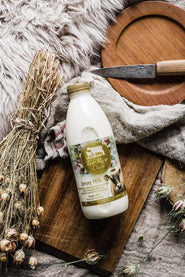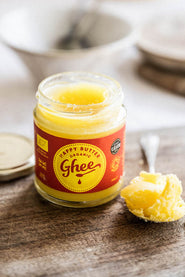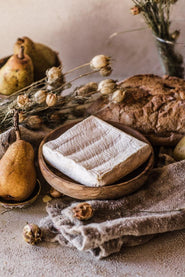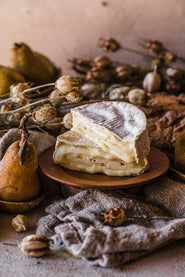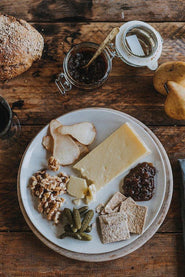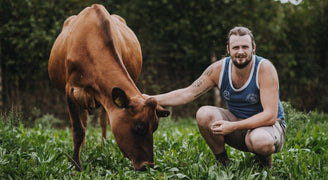Dairy farming has had a rough ride the past few years. Vilified for animal welfare principles and environmental impact alike, cows, and especially dairy cows, have been used as the poster child for Bad Farming. This is not without justification – there is no question that the collective sins of intensive beef and dairy agriculture, from biodiversity loss, pollution, carbon footprint and animal welfare issues, have quite rightly put the sector under scrutiny. But there is a flip side to this coin - we are working with producers who are showing there is a better way to do dairy, that it is possible to farm in harmony with nature, where cow and calf can be reared with care and respect and with grass under their hooves.

Dairy farming is a staggeringly large sector, with an equally wide spectrum of practice when you look at the global picture. Averaged carbon footprint figures for example are skewed by the impacts of intensive systems where herd size can be 6-700, such as in the north east of the USA where the number of small farms has decreased by 83% since 1960. This regional snapshot represents the global picture in developed countries, where consolidation of small farms is the absolute trend. Get bigger, drive down costs, move the animals indoors so you can control all the variables and benefit from the economies of scale.
This is the sticking point – small scale family farms, grass rearing a sustainably fed herd in hilly Devon and Cornwall have a very different environmental impact to an indoor soy-based mega dairy.
Feed production is one of the biggest causes of environmental damage from dairy farming. Modern hybrid breeds of dairy cow have been developed to produce staggering volumes of milk; from 6500 litres a year per animal in 2000, to 8000 in 2020, and they need high energy feed to fuel that productivity as grass alone won’t cut it. That extra carbohydrate and protein usually come from compound or ‘concentrate’ feed, which usually contain imported soy. Soybeans have high levels of essential amino acids which are crucial for healthy growth, and the crop is the main source of protein in the global food supply system, with the vast majority going into livestock feed. Production has gone from 26 million tonnes to 350 million tonnes globally between 1961 and 2018, but the crop has also been closely linked to deforestation in South America.

The other culprit of dairy farming is maize, which is turned into silage (pickled) for winter feed on many dairy farms, when the cattle need to be brought under cover to protect the soil. This heat-loving crop is at its geographical limit in the UK, often needing significant volumes of chemical fertiliser to prop it up. As it is harvested in September or October when autumn rains come, it has also been accused of fuelling soil erosion as rains wash away precious soils left exposed once the crop has been taken in. Having said this, steps are being made to improve this situation however, any farmers are now under-sowing their maize crops with grass or sow fast-growing grasses to prevent this though.
Yet there are visionary dairy farmers here in the UK showing the world how dairy can be sustainable, and we are really proud to be working with them. Sam at Taw River Dairy supplies us with remarkable Jersey milk. His herd of 80 Jersey-cross cows are 100% grass fed, as the breed is excellent at turning grass into milk, without any other feed required. What is particularly special about Sam’s herd, is that the calves stay with the mothers, as Sam explains.
“We’re a small, local team with a combined interest in farming sustainably and as naturally as possible. Allowing all our cows to rear their own calves is fundamental to our holistic beliefs. My grandfather provided milk in a very similar way for the local area more than 60 years ago so it is in our heritage to do the same.”
Milking just once a day, after the calves have had their breakfast, means production is lower but the quality of care and the milk itself is outstanding.

“All our land and animals are farmed organically and we have our own bee hives, our bees are important in the pollination of our herbal and grass leys. Our cows are 100% pasture fed, this is not only the best option for our cows but also for the environment. Low food miles and reduced carbon emissions are just a couple of the benefits of not buying in feed for the farm, as most concentrated feeds are often made up of cereals imported from all over the world.”
Meanwhile Kate and Rupert in south Devon use organic milk to produce their Organic Grass Fed Ghee – a natural alternative to processed cooking oils, as Kate explains.
“Ghee is a pure, natural fat, free of preservatives, and the total opposite of ubiquitous industrially produced ‘vegetable oil’ that goes through chemical refining, bleaching and deodorising processes. Everyone needs oil for cooking, but it is so often overlooked when we check the integrity of our ingredients.”

The couple only use organic butter to produce the oil, by heating it slowly to remove solidify the milk solids that otherwise make melted butter burn at high temperatures. Organic milk standards dictate that the dairy cows must be fed a grass-rich, GM free diet.
Sustainable practices are well in place with our cheesemakers too. Quicke’s have been making their traditional Clothbound Cheddar and Grass Fed Whey Butter for 50 years in a corner of mid Devon where the farm has been in the same family for five centuries. Grass is one of the south west’s finest crops, and they use a scientific approach to manage the grassland, so that as much grass as possible goes into the cows’ diet.
“There's an art to getting cows to graze, especially if you want them to sustain themselves on the grass for most of the year, as we do. We use a Kiwi-Grazing system,” explains Head of Farm and Estate, Paul Parfitt.

“We measure each paddock with a rising plate meter every week. It's a circular plate on a metal pole attached to a spring. You put the pole on the ground, and the plate rises to the level of the grass beneath it. You do this perhaps a hundred times and the meter counts high how the plate rises every time. Then you know how much grass is in the paddock, and how much it's grown since last time you measured. Do that every week and you can work out how much grass you've got across the farm.”
Similarly over in Somerset, the 160 head herd at Park Farm, the home of the delicious Bath Soft Cheese are reared holistically, in tune with the land.
“We are entirely organic – so that means no fungicides, pesticides or artificial fertilisers are used on our land. Instead we use manure and organic compost: the environment, the land and the waterways remain uncontaminated. Our milk and cheese is produced in a way that protects our natural world and lets every farm animal feel the sun on its back.”
The conventional model of dairy farming is driving the loss of small-scale family farms, as anonymising and commoditising the milk makes the farmer compete in a global market, where they can never win.

A farmer who sees their milk heading off in a tanker to be fed into a homogenised, standardised supermarket product is never going to get the feedback that a farmer making and selling artisan cheese at a local farmers market will. Neither will it be as prized by the consumer, nor will the consumer have the chance to understand the story of the farm and the people, of the time and skill that goes into the food they produce, and so our relationship with real food continues to be eroded.
Conventional dairy farming sees any profit go to processors and retailers, rather than the local community where the food is created. In contrast, sustainable dairy farming creates truly memorable artisan products crammed flavour and character, with no corners cut. Our dairy producers are proud of what they make, and we are proud to sell it…and our customers love it, so everyone wins. And it is that feedback, those words from a real customer who has eaten something they have made, from start to finish is what makes local food systems tick. It is connection. So here’s to doing dairy better for all.

